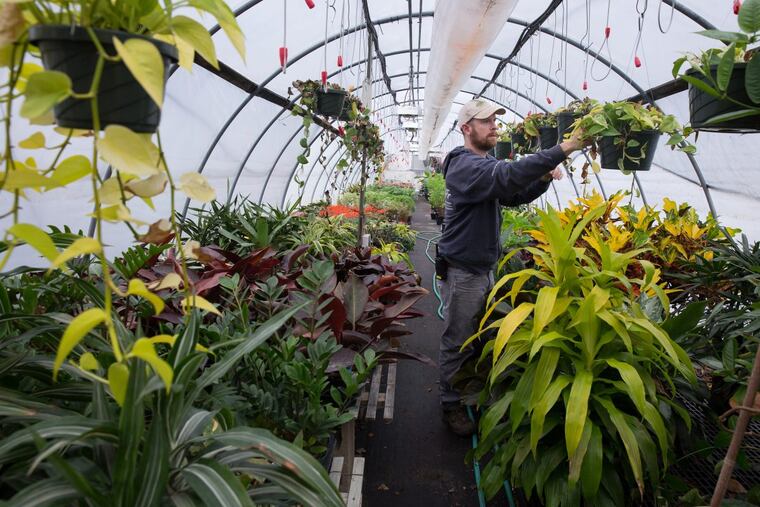At the Philadelphia Flower Show, water is the name of the game
This year's Flower Show is heavy on tropical plants and water conservation.

Bringing thousands of tropical plants to Philadelphia in the dead of winter for the annual Flower Show at the Convention Center is no easy task. From hurricane scares to early blooms, the Pennsylvania Horticultural Society has been forced to embrace flexibility in the last few months as it prepared for "Wonders of Water," the 189th iteration of the show, which from March 3 to 11.
In the entrance garden alone, visitors can expect to see 25-foot-tall palm trees, fishnet stockings with a lacy burgundy pattern on the leaves, water lilies, and the colorful purple-and-red blossoms of New Guinea impatiens. But getting these plants, which are used to much warmer weather, to the Convention Center has required lots of heat and, you guessed it — water.
"This year's Flower Show theme is allowing us to talk about water conservation in the most comprehensive way yet," Sam Lemheney, chief of shows and events for the society, said. "The rain forest is one of the best natural filtration systems on the planet, so we've layered in education with the displays."
The entrance to the Flower Show will be framed by palm fronds overhead to recreate the feeling of being in a tropical rain forest. The rain curtain, which reuses six to 10 gallons of water per minute, is a crucial component of the entrance garden because "it really immerses visitors with the sound of falling rain," according to Lemheney. (He said the focus on water this year hasn't really changed much regarding preparations for the show, but he is taking certain precautions in case of a leak.)
The centerpiece, a 25-foot-tall waterfall, is made from bamboo and steel, and features five different drops into the main pool. It uses 2,300 gallons of water, which will be filtered and reused through a pump for the week of the show. Surrounding the tubs of water are platforms of blooms from Valley Forge Flowers arranged in rainbow hues. Nearby, two misting pools with aquatic flora will round out Lemheney's vision of a transported, contemporary rain forest.
"We really wanted to incorporate the idea of a rainbow because of how much it has to do with water," Lemheney said.
As for education, the show includes a display on the Delaware River Watershed, as well as the first Philadelphia Water Summit, a one-day event that includes panels and workshops on how water affects our lives.
Lemheney had selected all the plants for the entrance garden during a trip to Florida in August and tagged the ones he wanted to use for the show, but what he didn't account for was Hurricane Irma. When the storm struck the Florida coast, Lemheney spent many hours worrying about the plants. Luckily for him, Irma moved up the west side of the state, sparing the tropical flora that is integral to this year's show.
The plants that aren't being shipped from Florida are being tended to in the society's greenhouses, including Meadowbrook Farm in Jenkintown.
Meadowbrook head grower Nathan Roehrich said he has about 12,000 plants, most of which are from local seeds and cuttings, that are going to be used in the show, including kiwi ferns and begonia escargot plants. He began growing the plants in November and keeps a close eye on them. The greenhouses are kept at a toasty 68 degrees Fahrenheit in order to force the plants into springtime activity. Some even have warming lamps overhead.
"Obviously, growing these plants in a greenhouse is not the most sustainable thing," Roehrich said. "But most of the plants get reused, because we hold a sale afterward for PHS members."
Roehrich and his staff hand-water all the plants, which he says uses quite a bit of water. The recent burst of warm weather has pushed some plants into blooming too quickly.
"If the Flower Show was this weekend, that would be perfect," Roehrich said. "But, unfortunately, we have to try to cool the ones that are blooming so they'll be in good shape for next week."
Most of the plants at Meadowbrook are doing well, but Roehrich was disappointed that the Amazon water lily, originally meant to be part of the entrance garden, did not take. He started growing it over the summer and moved it inside in November, but the giant lily pad didn't make it. (It did grow to an impressive two and a half feet in diameter, though.)
"It was a bit of a bummer when it didn't take," Roehrich said. "But I told Sam that one was kind of a long shot."
Tickets can be purchased online at theflowershow.com. They cost $29.95 for adults, $20 for students ages 17 to 24, and $17 for children ages 2 to 16 if purchased before March 1. Tickets purchased online during show week will cost $32 on weekdays and $35 on weekends for adults, $22 on weekdays and $24 on weekends for students, and $17 for children. Purchasing tickets on site will cost $35 on weekdays and $40 on weekends for adults, $24 on weekdays and $26 on weekends for students, and $19 on weekdays and $20 on weekends for children.